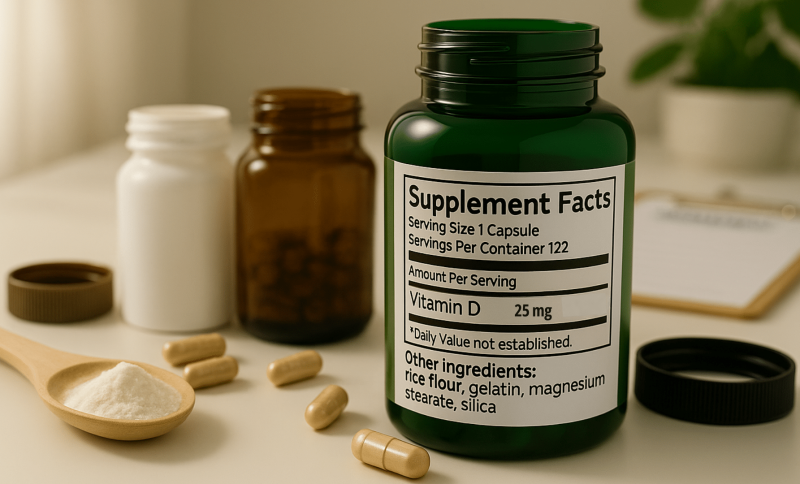As someone who’s been in the fitness and supplement industry for over a decade, I’ve seen countless clients worry about what’s actually in their supplements.
And honestly, they should be concerned. Walk into any supplement store, and you’ll find bottles packed with ingredients you can’t pronounce, including rice flour.
Here’s what most people don’t realize: supplement companies add fillers like rice flour to bind ingredients together, prevent clumping, and fill capsules to the right size.
While these additives serve a purpose, many of my clients ask if they’re safe or if they could be causing unwanted side effects.
In this blog, I’ll walk you through everything you need to know about rice flour in supplements, the potential risks, who should be cautious, and safer alternatives you can choose instead.
What Is Rice Flour and Why Is It Used as a Filler?
Rice flour is exactly what it sounds like: ground-up rice that’s been processed into a fine powder.
In the supplement world, it’s what we call an “excipient,” which is just a fancy term for an inactive ingredient that helps hold everything together.
The texture is smooth and chalky, similar to cornstarch, and it’s completely odorless when properly processed. Most rice flour used in supplements comes from conventional rice farming, though some premium brands opt for organic sources.
Manufacturers often choose rice flour because it’s naturally gluten-free, neutral in flavor, and easy to digest for most people.
Its widespread use is due to its affordability, accessibility, and low risk of causing allergic reactions compared to some other fillers.
What Is Rice Flour Added to Supplements For?

Supplement manufacturers use rice flour for several reasons:
- As a filler: When the active ingredients in a capsule don’t take up enough space, rice flour fills the remaining space. This ensures each capsule contains the same amount of powder.
- As a binder: It helps hold tablet ingredients together so they don’t crumble apart.
- As an anti-caking agent: Rice flour prevents powders from clumping together during storage.
- For capsule formation: It helps create the right texture for encapsulation machines to work properly.
You’ll also find other common fillers in supplements like microcrystalline cellulose (plant fiber), maltodextrin (a starch), and magnesium stearate (a fatty acid). Rice flour is often chosen because it’s generally well-tolerated and relatively inexpensive.
Is Rice Flour Safe?
The good news is that rice flour has been given “Generally Recognized as Safe” (GRAS) status by the FDA. This means that in typical amounts, it’s considered safe for most people to consume.
In supplements, you’re usually looking at very small amounts – often less than 50-100 milligrams per capsule. To put this in perspective, that’s about the amount of rice flour in a small bite of rice cake.
The European Food Safety Authority (EFSA) has also evaluated rice flour and considers it safe as a food additive. So from a regulatory standpoint, there’s no major red flag here.
However, “generally safe” doesn’t mean safe for everyone. And just because something is approved doesn’t mean it’s the best choice for your body.
Potential Health Risks and Negative Effects

While rice flour is considered safe for most people, I’ve seen some clients experience issues. Here are the potential concerns you should know about:
Allergies and Sensitivities
Rice allergies are rare, but they do exist. I’ve worked with maybe three or four clients over the years who had confirmed rice sensitivities.
For these people, even small amounts of supplements can cause digestive upset, skin reactions, and mild respiratory symptoms.
There’s also the cross-contamination issue. If the rice flour isn’t certified gluten-free, it might have been processed in facilities that also handle wheat. For my clients with celiac disease, this is a real concern.
Digestive Issues
Some people don’t digest rice flour well, especially in concentrated forms. I’ve had clients report bloating after taking supplements, mild stomach discomfort, and changes in bowel movements.
These symptoms are usually mild and happen more often in people who already have sensitive digestive systems.
Blood Sugar Concerns
Rice flour is a refined carbohydrate, which means it can potentially affect blood sugar levels.
Now, the amounts in supplements are tiny, so this typically isn’t a major issue. But for my diabetic clients or those following strict ketogenic diets, even small amounts of carbs matter.
The glycemic impact from supplement rice flour is minimal, but it’s worth knowing it’s there.
Heavy Metals Risk
This is probably the concern that comes up most often in my conversations with clients. Rice naturally absorbs more arsenic from soil and water than other grains. The FDA has found detectable levels of arsenic in many rice products.
The good news is that reputable supplement companies test for heavy metals, and the amounts in rice flour fillers are typically very low.
However, if you’re taking multiple supplements daily, those small amounts could potentially add up over time.
Other Additive Interactions
Rice flour doesn’t typically interact with other supplement ingredients, but it’s one more thing your body has to process.
Some of my clients prefer to minimize any unnecessary additives, especially if they’re taking several supplements daily.
Who Should Be Cautious?
Based on my experience, certain groups should pay extra attention to rice flour in their supplements:
- People with rice allergies or intolerances: Obviously, if rice bothers you in food form, it might bother you in supplements too.
- People with celiac disease: Always look for certified gluten-free rice flour. Cross-contamination is a real risk.
- Individuals on strict low-carb or ketogenic diets: While the carb content is minimal, some people want to avoid any unnecessary carbohydrates.
- Children and pregnant women: I always recommend that these groups consult with their healthcare providers before taking any supplements, especially those with multiple fillers.
- People with compromised immune systems: If your body is already dealing with health challenges, minimizing unnecessary additives might be wise.
How to Identify Rice Flour in Supplements

Reading supplement labels has become second nature to me, but I know it can be confusing for others. Here’s what to look for:
Common names for rice flour:
- Rice flour
- Oryza sativa flour (that’s the scientific name for rice)
- Rice powder
- Brown rice flour
- White rice flour
The ingredient list is usually on the back of the bottle, often in small print. Rice flour typically appears toward the end of the list since it’s used in smaller amounts.
Organic vs. conventional: Organic rice flour might have lower pesticide residues, but it can still contain naturally occurring arsenic. It doesn’t eliminate heavy metal concerns entirely.
Alternatives to Rice Flour in Supplements

If you’d prefer to avoid rice flour, you have options. Here are common alternatives I’ve seen in high-quality supplements:
| Ingredient | Function/Use | Notes |
|---|---|---|
| Microcrystalline cellulose | Plant-based fiber; used as filler or binder | Top choice for those avoiding rice flour; well-tolerated |
| Potato starch | Filler | Easy on the stomach |
| Tapioca starch | Filler | Great for multiple food sensitivities |
| Vegetable cellulose | Capsule shell and filler | Very clean and commonly used option |
| Silicon dioxide | Anti-caking agent | Safe in small amounts |
Each of these alternatives offers its advantages, whether you’re seeking a plant-based option, have food sensitivities, or want to avoid rice flour.
Microcrystalline cellulose is a top choice due to its plant-based origin and excellent tolerability, while potato and tapioca starches are gentle on digestion and suitable for many individuals with allergies.
Vegetable cellulose is especially popular for those wanting a clean, vegan-friendly capsule, and silicon dioxide is widely recognized as safe in small amounts for keeping powders free-flowing.
When selecting supplements, it’s always wise to read the ingredient labels and consider your unique dietary needs and sensitivities.
Conclusion: Should You Avoid Supplements with Rice Flour?
After years in this industry, here’s my honest take: rice flour in supplements isn’t something most people need to worry about. The risks are real but relatively small for the average person.
However, I do recommend being an informed consumer. If you have food allergies, digestive sensitivities, or just prefer cleaner supplements, there are plenty of rice flour-free options available.
My advice? Check your labels, know what you’re taking, and don’t be afraid to ask supplement companies about their testing procedures for heavy metals.
If you have specific health concerns, talk to your healthcare provider about whether rice flour fillers are right for you.
Have you noticed any effects from rice flour in your supplements? I’d love to hear about your experiences in the comments below. Your story might help other readers make better choices for their health.
Frequently Asked Questions (FAQs)
Can Rice Flour Cause Allergic Reactions?
Rarely, but yes. Rice allergies exist, though they’re uncommon. If you have food allergies, pay attention to how you feel when starting new supplements.
Does Rice Flour Affect Blood Sugar in Small Amounts?
The impact is minimal due to the tiny quantities used. Most people won’t notice any blood sugar changes from supplement rice flour.
Is Rice Flour in Supplements Gluten-free?
Pure rice flour is naturally gluten-free, but cross-contamination during processing is possible. Look for certified gluten-free labels if you have celiac disease.













